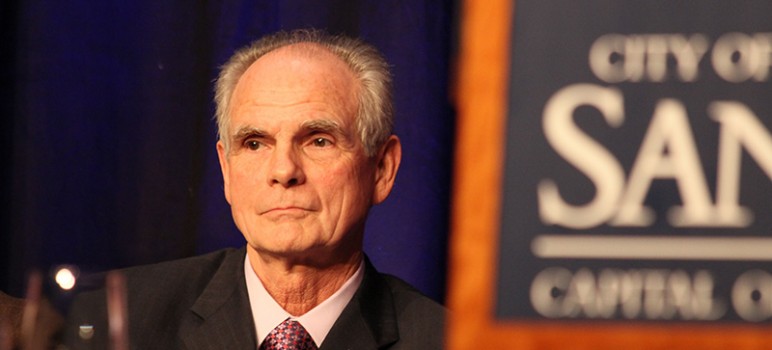Last week, Santa Clara County Judge Patricia Lucas issued a final Measure B verdict. A reader wondered in an email why we didn’t write about it. Fair point, which brings us to this update.
The final decision in the landmark pension reform case that forced employees to contribute 16 percent more of their pay to retirement costs is similar to the tentative ruling trotted out in December, except for a couple details.
First, current and new employees chipping in 50 percent of the cost of retiree healthcare and the city matching it one-to-one was found to be valid.
“In the final decision, Judge Lucas explained there would be a sharing of costs, a one-to-one funding ratio, between the city and the employee for retiree healthcare,” City Manager Ed Shikida explained in an email he sent to city staff. “However, she removed the term ‘a minimum of 50 percent’ as it could result in an employee contributing more than 50 percent, which she stated would impair a vested right.”
Second, Lucas clarified that employees aren’t guaranteed a specific healthcare provider when they retire, under both the federated, police and fire plan. The vested right here is that they receive healthcare, not that they’re owed coverage under a particular benefit plan.
“In this statement of decision, [Lucas] changed her earlier conclusion about the federated plan, noting that the municipal code’s description of eligibility of coverage does not relate to a specific benefit plan,” Shikida wrote.
The final ruling can still be appealed by both sides.
The judge’s second point relates mostly to employees who retire before 65 years old—before they qualify for Medicare, said Michelle McGurk, spokeswoman for Mayor Chuck Reed. At the time Measure B was enacted, city employees became eligible for retiree medical insurance coverage at 15 years of service. The benefit provides for 100 percent of the premium cost for the lowest priced plan available to active employees, currently a Kaiser plan.
“The employees, when they sued, said they’re guaranteed a specific healthcare plan, even though it changes every year with every negotiation,” McGurk said. “The judge looked at the language and said, ‘It’s not your vested right. … You have a vested right to healthcare and retirement, but not to a specific plan.’”
Measure B won 70 percent voter approval in June 2012, but was promptly challenged by city unions. They sued under the assumption that their retirement benefits approved at the bargaining table were a “vested right” that can’t be revoked just because the city encounters financial troubles. Reed is pursuing a statewide initiative that would weaken those vested rights, though the effort is held up in court and may not end up on the ballot until 2016.
Though the bulk of Measure B reforms were upheld in court, some critical points were invalidated. Lucas said the city must pay for pensions promised in labor contracts. Soaring retirement costs aren’t a good enough reason to renege on that obligation, she said.
Lucas also upheld a provision that allows the city to cut salary, however. Both unions and the city claimed some measure of victory after the initial ruling in December.
“We won, they lost,” Jim Unland, president of the Police Officers Association, told San Jose Inside at the time. “The vested right doctrine once again held up [in court]. [City officials] can play their cute numbers game, but the core of what Measure B was was invalidated.”
Unland told San Jose Inside on Tuesday that he feels the same about the final ruling and has maintained that the city's fumbled attempt to slash pension costs has resulted in droves of police officers leaving the San Jose Police Department because they can find better benefits elsewhere. He blamed Measure B for making the city unsafe and has held it over the six council members who supported it and most of whom are now running for mayor.
Meanwhile, the city and unions are talking about settling over some parts of the reform measures, like police disability pay. In January, Mayor Reed proposed making some clarifications to disability retirement to address some of the misunderstandings about the new rules bandied about among employees, according to the mayor’s policy analyst, David Low.
“I’m pleased that our police and fire unions have accepted our invitation to sit down and work through some of the issues related to our new disability retirement rules, which were enacted to curb abuses in the system,” Reed said in an email. “While these reforms have not yet been implemented, we understand that there has been significant confusion and misunderstanding about what these new provisions mean for injured public safety employees.”
Seriously hurt employees will still qualify for disability retirement and still have access to workers comp, Reed said. “We are also taking steps to ensure that injured employees who don’t qualify for a disability retirement are offered another job with the city and are provided salary continuation benefits,” he wrote.
Unland said he's not optimistic about the talks, because they only address part of the problem. "Ultimately, officers are going to leave because we have one of the worst retirement systems in the state," he said. "It's that simple."


Great Job Chuck Reed, council, and “overwhelming” majority of voters. All you managed to do was generate 10 million dollars in legal fees for the Meyers Nave law firm. But some say that was Chuck’s true intent all along. You also managed to leave your neighbors to fend for themselves as every cop with any sense left San Jose for a community that insists on law enforcement. Now we get the criminals we deserve. Great job Chuck, great job.
Update:
Yesterday, October 2, 2014, Judge Lucas ruled against the city on the issue of attorney fees. In addition to the millions of dollars the city has spent defending Measure B they must now pay millions of dollars in legal fees to the POA and fire department union.
http://www.nbcbayarea.com/news/local/Measure-B-San-Jose-Will-Have-to-Cover-Unions-Attorney-Fees-Judge-Tentatively-Rules-277964951.html